THE ZUNI EAGLE SANCTUARY
UPDATE-2008: Personnel changes and increased eagle population! We're not sure of the policy on tours currently -- if you have questions please contact Zuni Fish and Wildlife directly. Thanks!
UPDATE-2004:Last word from Steve Albert, Director of Zuni Fish and Wildlife, is that there are now 21 eagles being housed at the Zuni Sanctuary. The most recent addition was a local golden eagle who was hit by a car on the Zuni Reservation. It was not expected that he would survive his injuries, but with surgery and some TLC ... and now he is hanging out with a couple of other goldens at the sanctuary and doing well!
In a relatively short period of time, the Sanctuary has gone from zero to twenty-one and the expansion plans for the aviary/breeding facility continue.
None of the birds housed at the aviary are re-releasable due to their injuries. But they are healthy enough to parent offspring that can be returned to the wild. This project which helps the Zuni people to maintain their traditions will ultimately enrich us all by potentially increasing the numbers of eagles in the wild.
We are pleased to report that the Zuni Sanctuary, the first facility of its kind, was recently the recipient of an award from Harvard University!

ZUNI SPIRITS learned about the Zuni Eagle Aviary in the summer of 2000 when a brief article appeared in NEW MEXICO MAGAZINE. We were excited about program and decided that we'd like to help. We contacted the Director of Zuni Fish & Wildlife, Steve Albert, and proposed making regular monthly donations in support of this very worthwhile program. The aviary isn't just about the housing and care of beautiful raptors that would otherwise be euthanized. This program is about continuing valuable cultural traditions that have been in place for countless generations. Staff members collect the fallen feathers from these birds, and there are now 15, to be shared among the religious leaders of the Zuni community for various sacred ceremonial uses.
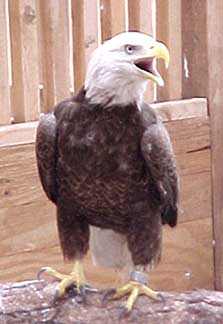 It is our hope that this special showing of eagles and other "winged creatures" provide further exposure for the aviary and your purchases will allow us to continue supporting this cause. Thus far, donations have bought a refrigerator and a freezer for food storage, as well as food for the eagles. The eagles are fed a commercially produced product along with donated elk, sheep, cattle, deer and fresh road kill, as well as rats, quail, mice, and chickens. I asked if the eagles had a food preference and Steve said they certainly prefer fresh meat to the commercial 'chow' that supplements their diet. Each bird eats about one-half pounds of food per day. Despite their 5' - 6' wingspan, they weigh only 7 to 12 lbs. Most of their body is feathers and their bones are hollow.
It is our hope that this special showing of eagles and other "winged creatures" provide further exposure for the aviary and your purchases will allow us to continue supporting this cause. Thus far, donations have bought a refrigerator and a freezer for food storage, as well as food for the eagles. The eagles are fed a commercially produced product along with donated elk, sheep, cattle, deer and fresh road kill, as well as rats, quail, mice, and chickens. I asked if the eagles had a food preference and Steve said they certainly prefer fresh meat to the commercial 'chow' that supplements their diet. Each bird eats about one-half pounds of food per day. Despite their 5' - 6' wingspan, they weigh only 7 to 12 lbs. Most of their body is feathers and their bones are hollow.
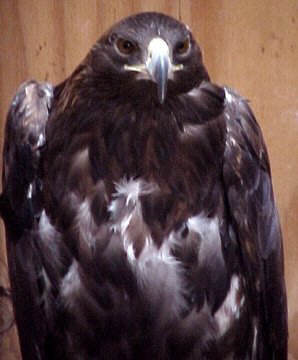
I have long had an interest in raptors, having had an experience in a school assembly when a traveling exhibit of red tailed hawks and owls visited my junior high. I remembered very distinctly my sense of awe and respect when the hawk flew overhead and I could feel the wind from its wings on my face. One of the highlights in visiting the eagles of Zuni is to have that experience repeated. It is quite thrilling to see a full grown eagle in flight and just being in their presence is a humbling experience.
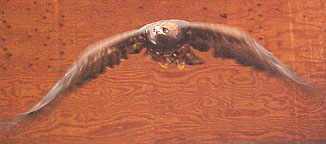
Each time we visit Zuni, we make a point of stopping by to say "keshi" to the eagles and to update our photo files. There are a mixture of golden and bald eagles, all with some kind of injury that prevents them from being released to the wild. Without this facility these eagles would have been euthanized. None are releasable and most do not have flight ability. Last summer there were nine eagles...less than one year later, fifteen eagles are being housed at the aviary.

With this dramatic increase in numbers, obviously there is need to expand the currently facility and talks are currently underway. The new expansion will also include a captive breeding area. These permanently non-releaseable birds will be able to produce offspring that will be released into the wild, thereby completing the circle.
Though there is some funding of this project, they also depend on private donations. If you would like to make a donation directly to the eagles, make your tax deductible check payable to "Zuni Fish & Game" and send to:
Zuni Fish & Game Department
Pueblo of Zuni
P. O. Box 339
Zuni, NM 87327-0339
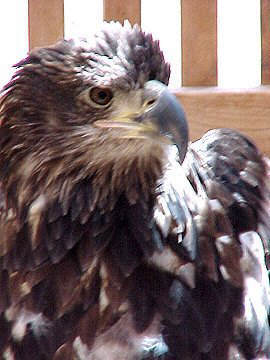 Zuni is the largest and most remote of the pueblos. And perhaps because of the remoteness, has remained one of the most traditional and orthodox tribes in New Mexico. The vast majority of people still practice the Zuni religion. Like many Native American religions, wildlife plays a vital part in its practice. Not only do Zunis revere wildlife, many species of animals are sacred and some are considered to be the incarnations of ancestors. One of these is the eagle and many aspects of the Zuni religion calls for the use of eagle feathers. The purpose of many ceremonies is to pray for rain and prosperity, not only for the Zuni people, but for all mankind. Long ago (before the Bald and Golden Eagle Protection Act) eaglets were captured, raised as a member of the family and treated with great respect and admiration. In exchange, their molted feathers were used as needed for various ceremonies. Today, the eagle aviary is helping to provide that need for feathers and gives these regal birds a healthy environment to live out their lives. And eagles in captivity, given proper care, can live up to 50 years.
Zuni is the largest and most remote of the pueblos. And perhaps because of the remoteness, has remained one of the most traditional and orthodox tribes in New Mexico. The vast majority of people still practice the Zuni religion. Like many Native American religions, wildlife plays a vital part in its practice. Not only do Zunis revere wildlife, many species of animals are sacred and some are considered to be the incarnations of ancestors. One of these is the eagle and many aspects of the Zuni religion calls for the use of eagle feathers. The purpose of many ceremonies is to pray for rain and prosperity, not only for the Zuni people, but for all mankind. Long ago (before the Bald and Golden Eagle Protection Act) eaglets were captured, raised as a member of the family and treated with great respect and admiration. In exchange, their molted feathers were used as needed for various ceremonies. Today, the eagle aviary is helping to provide that need for feathers and gives these regal birds a healthy environment to live out their lives. And eagles in captivity, given proper care, can live up to 50 years.
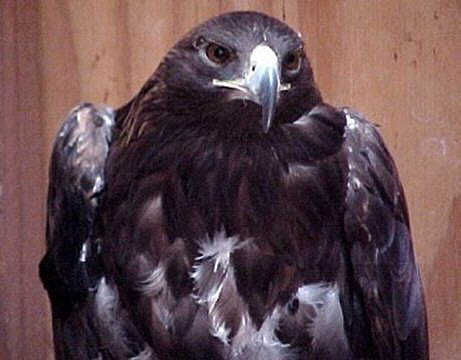
Without this facility, the only way for any Native American to get eagle feathers is through the U.S. Fish & Wildlife Service's Eagle Repository in Colorado. It often takes more than three years to receive an eagle carcass. A delay of this length is unacceptable when feathers are needed routinely for ceremonial use.
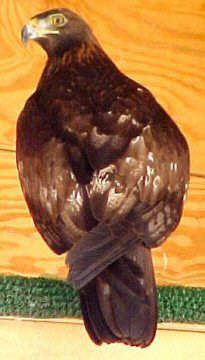
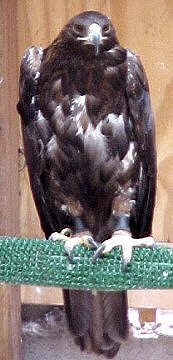

The building was completed in 1999 and is huge (large enough to house giraffes as David noted!) Standing 100' long, 25' wide and 18' tall, it is made of locally quarried Zuni sandstone and lumber from sustainably harvested trees which were milled at the Zuni Community sawmill. It blends beautifully with the Zuni landscape. It consists of the ante room where food is prepared, measurements taken, weight determined and other routine care is given to the eagles, separate large enclosures off the main aviary and then large flyway itself. The front of the building faces Dowa Yalanne, the sacred Corn Mountain.
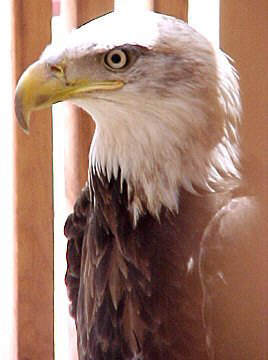
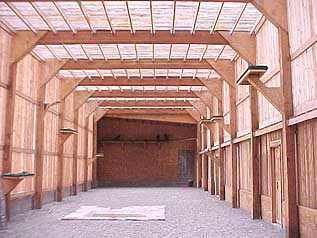
When I first visited the aviary in October of last year, the birds with flight (one mature and two juvenile goldens) were in the flyway. Later, in April, all but one of the goldens was in the fly way, While the goldens were in the smaller enclosures. It seems the goldens and the balds have different personalities and were being kept separate. This past June when we visited the aviary, there were both goldens and balds in the fly way. The staff keeps a close eye out for aggression, but it seems the balds and goldens are learning to cohabitate in the large flyway.
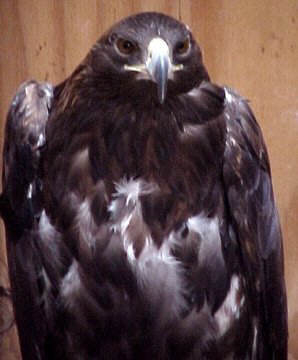
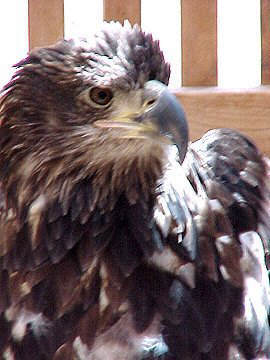
"Olla", on the left, is the only eagle that is routinely handled and used for demonstrations and educational purposes. "Ellie Mae" on the right (yes, she is from Tennesee), has a rather nasty disposition due, no doubt, to having had her tail feathers eaten off by a predator when as a young eaglet, she fell from her nest.
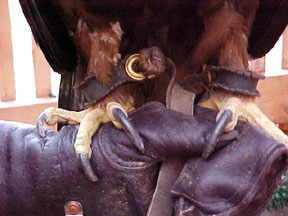
This picture of Olla's talons shows how powerful eagles are. Eagles can easily crush a rabbit, or if their talons are very sharp, they could cut thru a man's arm or a leg. The staff trims the beaks and talons of all the eagles for the safety of staff and eagles alike.
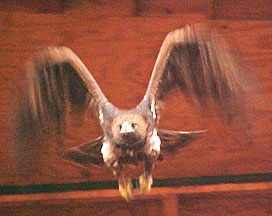
 The eagles receive regular veterinary care but to make the care more cost efficient, the eagles go to the doctor rather than the other way around. Steve showed me the specially built cages used to transport the eagles when trips to the vet are necessary. Steve said the the eagles were remarkable resilient and once in the cages seemed very secure. One thing that impressed me about the level of care these eagles are getting is that special creams are routinely applied to protect the skin on the feet. Since the vast majority of these birds are flightless they spend all their time on their feet, and being sensitive to that, the staff takes extra care to make sure that their feet remain healthy. A small point - but I was impressed with the thoughtfulness of that specific act of care.
The eagles receive regular veterinary care but to make the care more cost efficient, the eagles go to the doctor rather than the other way around. Steve showed me the specially built cages used to transport the eagles when trips to the vet are necessary. Steve said the the eagles were remarkable resilient and once in the cages seemed very secure. One thing that impressed me about the level of care these eagles are getting is that special creams are routinely applied to protect the skin on the feet. Since the vast majority of these birds are flightless they spend all their time on their feet, and being sensitive to that, the staff takes extra care to make sure that their feet remain healthy. A small point - but I was impressed with the thoughtfulness of that specific act of care.
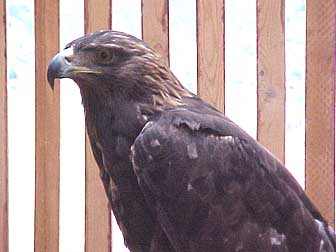
It is my hope that by reading about the Zuni eagles, you will want to learn more about them and possible donate to their care. These are other articles that I've found online about them. If you know of others, please let me know.
ENVIRONMENTAL NEWS NETWORK -
"Aviary Captures Spirit of Zuni Ancestors"
NEW MEXICO RESOURCES -
"Majestic eagles play a part in Zuni agriculture"
With so many traditions of Native Americans being lost to "progress", it is vitally important that we all do what we can to help insure that the traditions, the religion and the ceremonies that are ancient yet alive for the Zuni, be allowed to continue far into the future. If you would like to help, please do.
Pueblo of Zuni
P. O. Box 339
Zuni, NM 87327-0339
(505 782 5851
***************
^ Back to the top ^
***************
ZUNI SPIRITS - FINE ZUNI FETISHES DIRECTLY FROM ZUNI PUEBLO, NM
P. O. Box 337, Grapeland, TX 75844
All rights reserved © - Zuni Spirits & Darlene Meader Riggs - 1999 - 2010
Celebrating eleven years of PASSION for Zuni fetishes!
Page last updated:

Web Chick